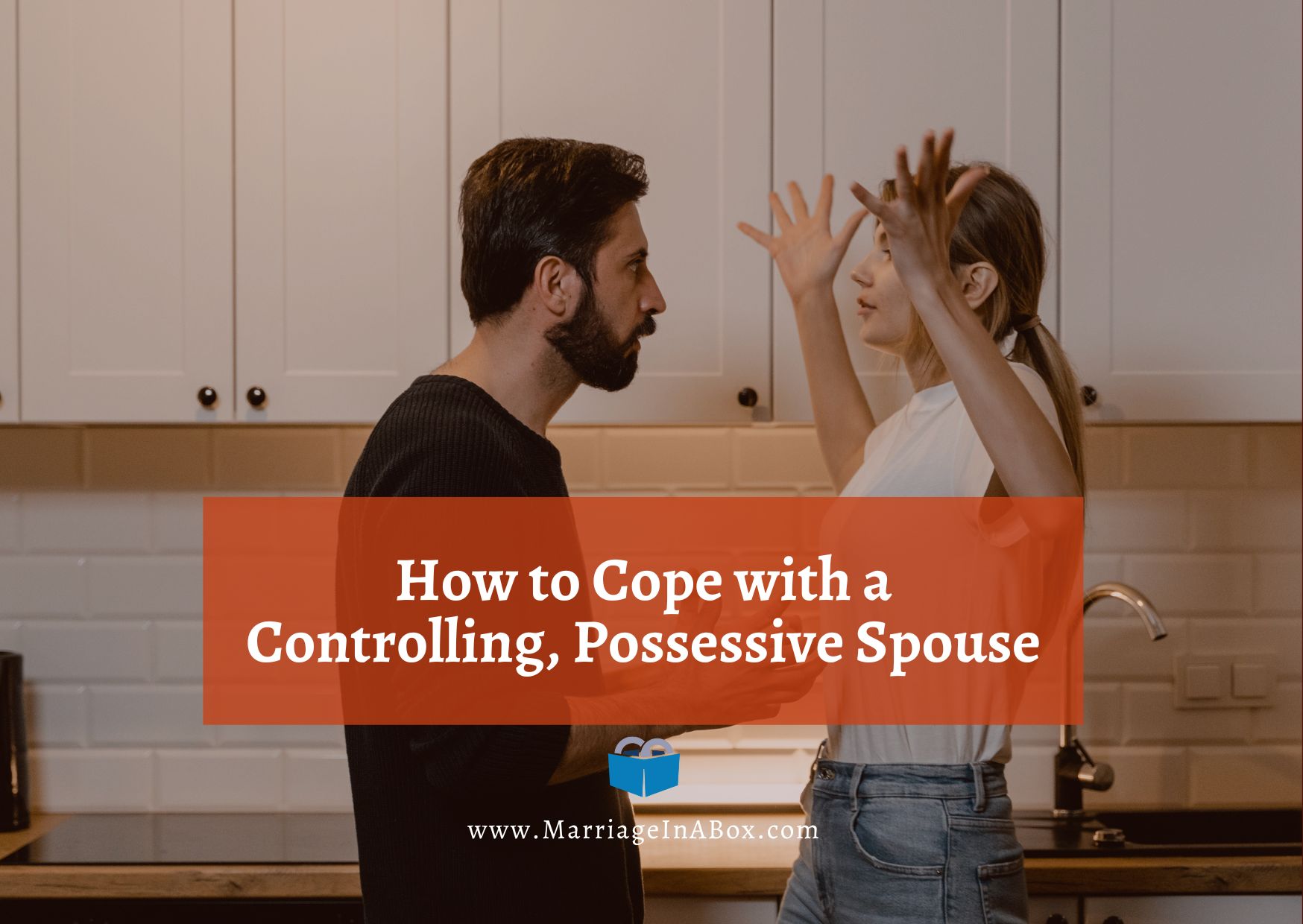Written by Licensed Marriage and Family Therapists, the Marriage in a Box blog shares insights into common relationship struggles, gives ideas for moving beyond the roadblocks, and helps you find your path to happiness – both individually and within your relationship.

Why is the Holiday Season so Hard for Most People?
Holiday stress is natural, but there are ways to manage it. The holidays include chores like cooking, decorating, shopping, wrapping, social events, and stressful family time. However, many people find this time of year to be a challenging time emotionally with missing family members who have passed, loneliness, or isolation. The good news is that there are ways to cope with these complicated feelings. It is helpful to learn how to survive the holidays with your mental health intact.
Understanding What Triggers Holiday Stress.
Making all the meals and decorating to perfection can become overwhelming. It can also be hard to find the time to attend every party, have family time, and take care of the everyday duties of work or children. Holiday stress can be triggered by becoming overwhelmed by having too much to do, feelings of loss over family that have passed away, or loneliness for those with limited friends and family.
There's a desire to cram in every tradition and event to make each day memorable. Stress can pile up quickly with the added cost of travel to visit family members. It can also be challenging to cope with difficult family members.
Five Ways to Calm Holiday Stress
-
Set Realistic Expectations
We tend to put a lot of pressure on ourselves and our loved ones for the "perfect" holiday. When circumstances cause us to be unable to meet this unrealistic expectation, we feel frustrated or disappointed. We must be realistic about what we care about most during the holiday season and look at the time, energy, and money available when planning. Being honest and authentic can cultivate peace and joy during the holiday season.
-
Accept Imperfection
Before preparing for the holidays, acknowledge that things will not always be perfect because imperfection is healthy and normal. For some of us, it takes a little practice. Avoid setting the bar too high; remember you are human to avoid feeling upset when you can't do it all. We tend to put a lot of pressure on ourselves and our loved ones for the "perfect" holiday. When circumstances cause us to be unable to meet this unrealistic expectation, we feel frustrated or disappointed.
We must be realistic about what we care about most during the holiday season and look at the time, energy, and money available when planning. Being honest and realistic can cultivate more peace and joy during the holiday season. Try writing down what you imagine for this holiday season and see if you can do a reality check and shift expectations to a mix of stressful moments and moments of joy.
-
Establish clear boundaries.
Social obligations can quickly become overwhelming during the holiday season, and dealing with challenging relationships or COVID-related stress can contribute to feeling overwhelmed. Too many activities, even fun activities, can culminate in holiday stress, leaving us feeling frazzled rather than fulfilled. Be aware of your limitations and permit yourself to set boundaries for those activities in which you partake.
For activities that feel more like an obligation than a pleasure, consider a pre-designated amount of time or avoid them altogether. See if you can focus on something you enjoy about the experience.
-
Make a budget and stick to it.
- Begin a budget early in the season to help you be more intentional about your holiday spending.
- Organizing your budget with categories like travel, gifts, or food makes managing planned purchases and their costs easier.
- Shop smarter and compare prices online or limit your shopping to Black Friday or Cyber Monday events; use tools and apps to maximize savings.
Remember that the commercial aspect of the holidays may not be why you, your family, or your children are the most excited about the holidays. What other things or childhood memories do you enjoy about the holidays? Please focus on the religious, family-oriented, or seasonal activities that give our holidays meaning. A great way to refocus our holidays is through volunteering our time to help support others.
-
Respond with Kindness
If you can't change others' actions during the stresses of the holiday season, you can change how you respond to situations. Be mindful that the holidays are tough for those who are alone or stressed. See if you can extend kindness to those without family and friends during this time of year.
If things get tense or difficult with someone, take a few deep breaths and shift your thinking to get a new perspective. Tell yourself that this person is suffering, causing them to act this way. It will soften frustration, help you be more compassionate, and remind you that it's not personal.
The holidays can be a mixture of joyful times and stressful times when families gather. Pulling off meal preparation, decorations, gifting, and possibly travel takes a lot of work and finances. This tension can affect family members, triggering negative behaviors, and the holidays may lose their luster. Consider using Marriage In a Box for helpful suggestions and guidance about managing stress during the holiday season.
Marriage In a Box provides access to tools and techniques professionals use for relationship issues. You can set goals, earn rewards, and find marriage coaching on the site. Check out the available kit and sources of information online.

Difficult people are everywhere, and you must find a way to deal with them. When a family member is hard to deal with, we cannot remove ourselves from the situation because their connection to us is more complicated and intimate. When acquaintances like friends, colleagues, lovers, or neighbors become difficult, you can remove yourself from the situation. With family, we are more obligated to get along to avoid putting stress and strain on other familial relationships.
Trying to fix a problematic family member is easier said than done, and the more one tries, the more demands the difficult person makes. Recognizing and stopping an interaction with a difficult family member is essential when it's no longer about solutions and only about winning.
Causes of Family Drama
Family drama can happen due to poor communication, unresolved issues from the past, and personality conflicts. If left alone, these conflicts can impact our mental well-being negatively and create a toxic family environment. It is best to recognize warning signs and take action to maintain healthy relationships with your family members and avoid drama.
Communication Breakdown
When people in a family don't have open and honest communication, it leads to misunderstanding, which can cause stress and tension. People sometimes need to listen better, find it difficult to say what they mean, and jump to conclusions. With better communication, talking openly, and with empathy, family members can clear up confusion and create a happier, more understanding atmosphere.
Personality Clashes
Family members might not be in sync with each other's values and beliefs or have conflicts with their personalities. These tensions lead to arguments and escalate if not dealt with properly. The family must show empathy, respect each other's differences, and find acceptance to keep the peace at home.
Past unresolved issues
Holding grudges and unresolved past issues cause trouble and strain relationships between family members and loved ones. These issues can make family get-togethers and everyday life tense and uncomfortable. Families can strengthen relationships with each other and decrease tensions by facing problems directly, having honest conversations, and finding solutions.
Common Instigators of Family Drama
There can be socially toxic individuals who may be holding long-term grudges or personality tensions and are not mindful of whom they hurt. These individuals may display some of the following characteristics:
- No filter of speech or actions to the point of offending others.
- Short temper over the slightest event.
- Tendencies to be opinionated, rigid, suspicious, and hold grudges without forgiving.
- Needs to be the center of attention or will act out.
- You and others must gauge this person's mood and walk on eggshells around them.
- They use a victim role or expect special or royal treatment.
Dealing with prolonged family drama and stressful situations can damage mental and physical health and cause feelings of anxiety, depression, and psychological issues. Family drama creates an unstable, unpredictable atmosphere and can become unsafe if left unchecked. Finding healthy ways to cope is imperative to maintain your overall well-being.
Plan for a Positive Way to Reduce Family Drama
What can you do to reduce family drama:
-
Don't ignore toxic behavior; set boundaries regarding unacceptable behavior, even if it means barring adult children from holiday meals unless behaviors change.
-
Avoid discussing topics that become divisive, and don't allow someone's drama to diminish your enjoyment of the holidays.
-
Set time limits and start without those who don't show up to avoid attention-seeking dramatic entrances.
-
Dangerous behavior (excessive drinking, weapons) or divisive behavior that victimizes others should not be allowed. If things get out of hand, call the police.
-
Remember, we are only safe when we avoid or control those individuals or situations that would harm us; you have no social or familial obligation to be victimized.
-
Give praise for attempts to get along and accept each other.
Strategies to Deal with Family Drama
Handling family drama can be challenging, but these strategies can help make your family life more peaceful and loving. Remember to talk openly, listen attentively and empathetically, and avoid misconceptions. Set firm limits, avoid divisiveness, ensure safety, and learn how to handle conflicts and compromise for solutions. Understand your and others' emotions, avoid blame, and forgive and let go. Spread positivity by planning outings and celebrating achievements among your family members. Get professional help if there is difficulty resolving issues. By implementing these tips, you can have healthier family outings and relationships and less drama.
The holidays are when families gather, and not all family members are free of drama in their lives and can bring their issues into the atmosphere. Other family members can be affected by this tension, and the holidays may lose their luster. If you struggle with managing episodes of family drama at this time, consider using Marriage In a Box as a resource for helpful suggestions and guidance.
Marriage In a Box provides access to tools and techniques professionals use for relationship issues. You can set goals, earn rewards, and find marriage coaching on the site. Check out the available kit and sources of information online.

Everyone wants their partner to respect and value what they do to make the relationship work. Maybe your significant other isn't acknowledging your efforts, or you feel taken for granted. Whatever the case, there are things you can do if you feel unappreciated in a relationship. A simple expression of gratitude improves well-being and relationships. Gratitude even makes you happier and healthier! Feelings of being unappreciated by your significant other, not a stranger or acquaintance, are more intensely painful.
What is Appreciation and Gratitude?
The Oxford English Dictionary says gratitude is a feeling of wanting to express your thanks.
Grateful people value others, enjoy simple pleasures (sunshine, smiles, etc.), express their gratitude, and are less likely to feel they are missing out on life. According to the Merriam-Webster dictionary, appreciation expresses admiration, approval, or gratitude.
The importance of appreciation and gratitude in marriage
It is reasonable and healthy to expect your partner to appreciate and make you feel valued over what you do for the relationship. Appreciation is significant in a relationship and without it you may think that nothing you do is good enough to make your partner happy, and the relationship will suffer. Part of a healthy relationship is feeling like you are appreciated and matter to your partner. If you feel unappreciated, you may worry that you are the only one fighting for the relationship or that your spouse wouldn't miss you if you left.
A lack of appreciation leads to resentment toward your partner, which is not part of a healthy relationship. Feeling loved, appreciated, and supported by our partners communicates that our partners care about and find us necessary, generating a sense of safety and security. Research has found that feeling and expressing gratitude in marriage leads to higher marital satisfaction because it shows that our partners view us as essential and valuable, which leads to greater satisfaction within the relationship.
Benefits of expressing appreciation and gratitude to your partner
Science shows that acknowledging and expressing gratitude can enhance the following:
● Better and more satisfying relationships
● Physical health
● Longevity
● Life satisfaction
● Positive mood
Conversely, gratitude can minimize :
● Depression
● Negative moods
● Anxiety
Expressing gratitude shows you care and generates compassion and optimism. It reciprocates kindness, celebrates the positive, and acknowledges that a good deed by the other person makes us happy and satisfied and helps our mental health. Gratitude paves the way for future acts of kindness to help us get through difficult times and flourish in good times, boosting and deepening our relationships and mental health.
Why is it so hard for people to express appreciation and gratitude?
The truth is that some people are more naturally grateful than others, and for some, gratitude takes work. These differences can be rooted in our brains, genes, and personalities. Gratitude isn't purely hard-wired; there are things you can do to bring more appreciation into your life.
1. Grateful genes
Research shows a gene that influences gratitude that helps explain why some people find it easier to feel and express gratitude than others. It is involved in the recycling of the neurotransmitter dopamine in the brain. There is also a genetic connection with people feeling less grateful and less sensitive to positive life events. These people may be super-sensitive to adverse life events, resulting in decreased positive personality traits like gratitude and forgiveness.
2. A grateful brain
Research suggests the possibility of differences in brain structure and activity between people who are more and less grateful; we can't say whether those differences result from nature or nurture or some interaction between the two.
3. Personality pitfalls
Our genes and brains aren't the end of the story, as certain personality factors can also act as barriers to gratitude. Envy, materialism, narcissism, and cynicism can diminish thankfulness. It may be difficult or impossible for people who are envious or materialistic to be grateful.
Five Ways to Show Your Appreciation and Gratitude
Showing gratitude to your partner can have many benefits. If you struggle to find ways to show appreciation, these tips may help you cultivate gratitude in your relationship:
1. Compliment your partner out loud.
2. Help give your partner a break from the workload.
3. Involve the children in thanking and appreciating your partner.
4. Write notes, texts, or letters of appreciation and gratitude.
5. Be thankful for your partner even when they aren't present.
In this season of gratitude and thanks, remember that you can strengthen your relationship simply by sharing your appreciation for your partner.
A lack of appreciation for your partner can devalue them and harm your marriage. When partners express gratitude and appreciation, their marriages can become more robust. Marriage in a Box offers helpful suggestions for becoming a more appreciative spouse.
Marriage In a Box provides access to tools and techniques professionals use to address relationship issues. The site allows users to set goals, earn rewards, and find marriage coaching. Users can also check out the available kit and sources of information online.

Mutual respect differs from person to person, but it is reflected in how partners treat each other daily. In healthy relationships, partners are equals and do not have authority over each other. The loss of mutual respect can lead to a stressful, painful, and unhappy life for a couple and quickly destroy a marriage. Without mutual respect, couples will have trouble working through conflicts. Respect can erode due to daily stresses and strains, causing irritability and negativity toward each other, which is disrespectful.
What is Mutual Respect?
Mutual respect is straightforward; it means treating your spouse or partner thoughtfully and courteously. Mutual respect isn't rude or disrespectful ( name calling, insulting, or demeaning); it doesn't ignore or avoid your partner. Finally, mutual respect views your partner's opinions, wishes, and values as worthy of serious consideration. It is not just the absence of negative behavior but the presence of positive behaviors. It takes consistent effort to treat your spouse or partner respectfully by doing things like:
● Considering your spouse's opinion
● Consult with your partner before making a decision that affects them.
● Take an active interest in your partner's life (work, interests, and daily activities
● Negotiate and work with your partner about important issues affecting you and your family.
Mutual Respect Facilitates Many Things in a Relationship.
Many factors contribute to a long-term relationship's viability, but mutual respect facilitates so much in a relationship like:
● Problem-solving. If both people respect each other's intelligence, common sense, and benevolence, disagreements are more likely to be solved, bringing the couple closer.
● Acceptance of difference. Where there is a foundation of mutual respect, people are more likely to accept their partner's differences in values, physical appearance, personality traits, quirks, past experiences, and interests.
● Resilience. Couples with mutual respect can more easily agree to disagree on an issue, not hold a grudge, and move forward.
● Mutual respect enables strength to uphold healthy boundaries in the relationship.
● Mutual respect requires remembering you are both on the same team during conflict.
● Mutual respect helps to strengthen the friendship between you and your spouse.
How to Show Respect in Your Relationship
Healthy relationships are founded on mutual respect, shown through positive behaviors, such as listening to your partner, honoring their requests and boundaries, supporting their dreams and desires, and speaking kindly about them to others. When you respect someone, you regard them highly through your behaviors, actions, and words. Differences between spouses are accepted.
There are some simple steps you can take to change habits and patterns to more responsible ways of relating. Here are some tips:
● Listen attentively when your partner's shares needs, desires, and concerns.
● Respond to what your partner asks for and in a timely fashion.
● Acknowledge, appreciate, and show gratitude for what your partner does and who your partner is.
● When using humor, be careful not to wound.
● Don't share intimate details or violate confidentiality.
● Be careful not to go over the line to criticism with complaints.
● Avoid cutting sarcasm and use soft words.
● Speak first to your partner rather than sharing concerns with others.
● Avoid impatience and irritable tones.
● Be compassionate when your partner makes mistakes.
● Assure your partner that there is room for many opinions.
What To Do if You Don't Feel Respected
If you don't feel appreciated by your partner, here are some strategies that might help:
1. Improve Your Communication as A Couple
Focus on how you communicate with each other, especially during conflict. Practice active listening, expressing feelings, and using your senses. Learn to say how you feel when your partner does something hurtful and ask for what you want. For example, you might say, "I feel disrespected when you make fun of me in front of my friends, and I'd like you only to sound upbeat about me, especially when we're out. Make eye contact, use a soft voice, ask clarifying questions, and avoid defensiveness.
Wise couples don't take their partners for granted and are eager to contribute to their relationships.
2. Be Clear on Your Boundaries
Focus on boundaries that may be needed with your partner. When you set them, make sure they are clear and understood. You should not have to explain or justify why this is necessary continually; your partner should be respectful. It's up to you to keep and maintain these boundaries and speak up if needed. Misunderstandings about boundaries do pop up, but couples in healthy relationships address them.
Re-establishing Respect in Your Relationship
It can be challenging to change if a couple falls into a pattern of treating each other with disrespect. Both partners must be willing to change their behavior. To avoid escalating tension, work on changing your behavior only and avoid policing your partner's behavior. The golden rule says to treat your partner as you would like to be treated. Once greater respect has been established, couples can work on making requests more effectively, solving problems, and accepting differences.
If you have trouble finding respect in your relationship, a professional can guide you through the steps to re-establishing respect and finding joy in your marriage. Marriage in a Box provides helpful tools and professional techniques.
Marriage In a Box uses solutions used by professional marriage counselors. Marriage coaching is also available on the website. Check out the available kit and online sources of information.

It is exhausting and soul-depleting to live in a toxic marriage. You're mentally, emotionally, and physically exhausted because there's no peace at home, which is supposed to be your refuge. The good news is that if both partners are willing to make the right changes, toxic marriages can become healthy and secure partnerships. However, if safety and security are at risk in the family, it may be better to separate.
What is a Toxic Marriage?
A toxic marriage is a chronic condition if there are unhealthy mental, physical, and emotional issues. These issues may lead to emotional abuse, substance abuse, adultery, physical abuse or desertion, or other major transgressions that cause trouble in a marriage.
Why are Toxic People Harmful?
● Toxic people can be self-centered, manipulative, abusive, and lack empathy.
● Toxic people may constantly demand attention, sympathy, or validation.
● Toxic people tend to disrespect emotional and physical boundaries and erode our self-esteem.
Signs You Are in a Toxic Marriage
● Resentment
Holding grudges chips away at intimacy. Over time, resentment can build up and widen the chasm.
● Dishonesty
Lying is a very unhealthy behavior that creates mistrust.
● Disrespect
Being late and forgetting events and other verbal or nonverbal behaviors that show disrespect are a red flag.
● Negative financial behaviors
It can be toxic if you agree about your finances and one partner constantly disrespects that agreement.
● Constant stress
Ordinary life challenges, like illness and job losses can create tension in your marriage. However, finding yourself constantly on edge is a critical indicator that something's off.
● Ignoring your needs
Always going along with whatever your partner wants, when it goes against your wishes or comfort level, is a sign of toxicity.
● Lost relationships and loss of self-care
If you've stopped spending time with friends and family or let go of your usual self-care habits (withdraw from hobbies, neglect health, and sacrifice free time) to avoid conflict with your spouse, you may be in a toxic relationship.
● Walking on eggshells
If you avoid conflict to avoid upsetting your partner and your partner won't listen to your concerns, your relationship could be toxic.
Is a Toxic Marriage Worth Saving?
Staying in a toxic marriage without changing anything will be soul-destroying, exhausting, devastating, and unhealthy for your health and well-being, not just for you but also for your spouse. A toxic marriage is worth saving, but it requires a lot of effort and commitment from both spouses!
Steps to Take to Fix a Toxic Marriage
When people are stuck in harmful patterns and cycles, it is toxic; unhealthy dynamics can be mended with conscious time, effort, and self-awareness. Both people must be willing to change and accept responsibility to move forward.
Here's how to fix a toxic relationship:
1. Evaluate whether the relationship can be fixed.
Yes, toxic relationships can change if spouses are equally committed to change and use self-reflection with honest, open communication and possibly professional help. It requires self-examination of your actions and doing inner work. Suppose you or your partner is unwilling to put in the effort; the relationship will not change, and you should consider ending it.
2. Be willing to walk away.
Before confronting a spouse, ensure your feelings of strong self-esteem and self-confidence are good enough for you to know that you will be alright. If you're unwilling to leave the marriage, your partner learns they can get away with things.
3. Look for the ABCD Behaviors.
A toxic relationship has a constant presence of ABCD behaviors(accusations, blame, criticisms, and demands).
4. Use your Voice and Start Taking up Space.
In toxic relationships, you find yourself resentful about not honoring yourself or your own needs to be included in the marriage to avoid upsetting your partner. It's healthy that you feel relaxed and can be yourself and bring up concerns. Exercise your voice thoughtfully; it's a muscle, so keep using it! Share how you feel and how it creates distance in the relationship.
5. Seek out help.
If one or both partners feel worse about themselves when they're in the relationship, it is toxic. You may need professional help to become stronger. Healthy love is nurturing and doesn't involve any acts of earning. You are good enough simply by being who you are.
6. Learn to trust yourself and stick to your guns.
Toxic relationships often involve gaslighting, which may cause you to doubt your judgment. Cultivating mindfulness practices can be vital to learning how to trust yourself and your own experience. Notice the inconsistencies between what is said and what is happening, and let your partner know you will only engage once they're willing to listen to you.
7. Together, explore healthier ways to express criticism.
Habitual criticism, judgment, or condemnation is harmful and not helpful in marriage; it crosses the line.
8. Only move on from conflicts with plans to change.
It is better if partners move on with a plan in place for change and how to approach conflict differently. Establish a safe space where partners can share their feelings, needs, and desires without using the ABCD behaviors.
If you and your partner are struggling with toxic behaviors, Marriage In a Box may be an option for helping to learn new skills, and get suggestions, and support. It is also essential that both spouses know interventions and boundaries to repair the damage in their marriage.
Consider Marriage In a Box for helpful advice and solutions. Marriage In a Box allows you to access tools professional marriage counselors use and solutions for relationship issues. Marriage coaching is available on the website. Feel free to check out their kit and sources of information online.

If you suspect your partner is cheating, you'll want to get to the bottom of things quickly. Try not to dismiss gut feelings if you feel your partner has a secret or is hiding something, and red flags keep popping up. It's important to avoid jumping to conclusions as you may be overthinking the situation.
Signs Your Spouse is Hiding Something from You
There are some hallmark signs that experts say that someone is hiding something. Here is a list of common behaviors from someone who has a secret but won't tell.
They're Being Overly Nice
Your partner may be giving special attention if they think you are suspicious of wrongdoing.
They're Protective of Their Cell Phone
If they are overly protective of their phone and take it everywhere, even to the bathroom.
They continue to Over-React
They may blow up and act like you invaded their privacy if you ask how their day was at work to get you off their case because they felt you were onto their hidden secrets.
They Turn the Tables and Accuse You Of Cheating
Cheaters may project their guilt and blame onto someone else.
They're Emotionally Aloof
Your partner may be distant because they're hiding secrets.
Their Schedule is Erratic
A change in your partner's schedule could be suspect if they don't have a new job or haven't taken on any responsibilities you know about.
You Catch Them in Lies, they are vague.
Trust is crucial in any relationship; however, when someone tries to hide something, inconsistencies can point to hiding secrets.
Your Partner Cuts You Out of Their Life
If you've always done everything together but are suddenly uninvited to things, it's a red flag.
Their Body Language or non-verbal cues seem off.
They may be more intimate or become detached, cold or close off affection, and avoid looking you in the eye.
They suddenly start to improve their appearance.
You may see a new haircut, clothes, cologne, working out, dieting, or grooming.
Your partner may become more adventurous.
Having an affair makes people feel daring, young, and alive. Your spouse may suggest spontaneous, fun activities they would usually never be up to and have re-awakened their drive for intimacy.
Why Keep Secrets?
According to the researchers, people in relationships keep secrets for many reasons, such as reluctance to damage the relationship or lose their partner. Shame is another driver for keeping secrets if it would lead their partner to disapprove and lose faith in them. Fear of being abandoned or stigmatized. There may be secrets about their core identity that keep their partner from having a complete picture of their flaws.
Signs Your Spouse Isn't Being Honest:
● Evading questions
● Suspicious body language/nonverbal cues - minimal eye contact
● Covering their mouth
● Being vague/overly detailed
● Voice sounds weird
● Inconsistent stories
Why People Lie
People lie for various reasons, which may include:
● Avoiding conflict or embarrassment or facing consequences of their behavior
● Fear of losing their spouse
● Hiding something they did or did not do
● Postponing having to make changes in lifestyle
● Trying to protect someone else's feelings
Harmful Effects of Secrets and Lies
While someone might lie to protect their partner's feelings or avoid conflict, lies can cause problems in a relationship because they decrease trust and intimacy. If someone lies to you and you find out it will cause great pain. It can deprive a partner from taking informed action if important information is being withheld.
How To Deal with Secrets
● Collect your feelings.
● Ask yourself if your partner did something to make you lose trust in them or if you are overreacting to the situation.
● Calmly talk to your spouse about your suspicions with open, honest communication, avoid interrupting or accusing them, and listen to their defense, but trust your gut.
● If you find your partner has been unfaithful, surround yourself with loved ones you can confide in to lower psychological distress and decide next steps.
How to deal with dishonesty
Dishonesty in a relationship is a significant issue. If you suspect your partner is untrustworthy, knowing how to fix dishonesty in a relationship is the best. The tips below will show you how:
1.Speak to your partner about it.
Avoid confrontation, let your partner know how their actions make you feel, and allow them to explain themselves and listen actively.
2. Understand their perspective.
Try to be reasonable and understand their viewpoint without criticizing or interrupting them, and remember, the goal is to fix your relationship.
If you and your partner are struggling with infidelity, Marriage In a Box may be an option for help learning new skills, suggestions, and support. It is also essential that both spouses know interventions and boundaries and repair the damage in their marriage. Consider Marriage In a Box for helpful advice and solutions. Marriage In a Box allows you to access tools professional marriage counselors use and solutions for relationship issues. Marriage coaching is available on the website. Feel free to check out their kit and sources of information online.

Controlling people want to assert power or control over another person. They can use manipulation, intimidation, and be overbearing to get their way. The person experiencing controlling behavior can feel fear, anger, despair, embarrassment, or inferiority. Using control can and often becomes abusive. If someone in your life is controlling, it is vital to reach out to supportive friends, family, or a therapist and learn to strengthen your boundaries.
Common Signs of Possessive and Controlling Behavior in Marriage
Sometimes, a controlling person is emotionally manipulative and acts out of insecurity but may not be aggressive; but behaviors can become aggressive. Controlling people may use a variety of tactics; here are some examples of controlling behavior:
• Inflexibility
Controlling people insist that everything needs to be their way and often won't adapt or take no for an answer.
• They Want to Be the Center of Attention
They have a strong need to have the focus on themselves. They often redirect the conversation back to themselves if you talk about your life.
• Isolation from friends and loved ones
A controlling person may seem possessive and unreasonably jealous of others in your life.
• Manipulation and blame shifting
Manipulation is a key component of controlling people because it gives them a sense of power and control. They may use guilt, criticism, belittling, gaslighting, sulking, or threats. Controlling people feel that nothing is their fault and use a technique known as projection to shift blame back to you.
• Disrespect of Boundaries
Boundaries between two people are respected and valued in healthy relationships. For the controlling person, a boundary is a barrier to their need for control.
• Keeping Score
They may keep a mental scorecard and remind you if they have done something for you and will get more than they give.
• Trying to Change You
A controlling person may tell you how to dress or criticize your appearance, ridicule your interests, and convince you to adopt their interests.
• Intimidation
They may use intimidation in several different forms. Someone who talks down to you in front of others or threatens you in a violent or non-violent way is using a form of intimidation.
Causes of Possessive and Controlling Behavior
Some of the factors that can trigger controlling behavior are:
Anxiety: Taking control of situations is a way to cope with stress for some people. Treating anxiety may improve controlling behavior.
Personality Disorder: Some personality disorders may increase the chances of someone using controlling behavior.
Learned Behavior. A person may have learned to control from caregivers who tried to exert power over their partner.
The Impact of Possessive and controlling behavior in a relationship
The desire to control is unhealthy and may cause relationship conflicts, but it's not always abusive. Controlling behavior becomes abusive when threatening and can include degradation and threats leading to domestic violence. Studies show that controlling behavior is associated with more physical aggression or abuse. It may be so constant that you become numb and relent to their demands for peace. Controlling behavior becomes abuse when the other person feels afraid and intimidated.
What to Do if Your Spouse is Possessive and Controlling
● Use open, Honest Communication
● Define controlling, possessive behaviors.
● Set Healthy boundaries.
● Practice Ways to diffuse the situation, such as:
● Quietly walk away to focus attention on their dysfunctional behavior rather than indulging them.
● Create a distraction or change the subject; interrupting them will make it more difficult for them to return to where they left off.
● Counteract with reason.
● Acknowledge their fear of abandonment and the fear that the person will leave them for someone else and discuss it.
Ways to Change Excessive Control in Your Partner
- First the spouse must recognize controlling behaviors and come out of denial.
- Second, upon gaining insight, the one on the receiving end of the control might have damaged trust.
- Third, by first practicing forgiveness toward the partner
- Fourth, the controlled person needs to bring up the issue of fostering mutual respect in the relationship. Respect honors the dignity of the other person and oneself because each is a person, but it doesn't mean accepting all behaviors or requests from the partner. Respect comes from thinking daily about mutual respect by honoring the personhood in one another so that these thoughts become internalized.
Many people have problems with controlling and possessive behaviors in marriage. It is crucial to recognize them and make repairs quickly to work toward utilizing these behaviors less and less. It is also essential for both spouses to be educated about these behaviors and learn interventions and boundaries, as they can damage a marriage. Consider Marriage In a Box for helpful advice and solutions.
Marriage In a Box provides access to tools, techniques, and solutions professional marriage counselors use for relationship issues. Marriage coaching is available on the website. Feel free to check out their kit and sources of information online.

In the early stages of a romantic relationship, a strong attraction draws you together and drives your thoughts, actions, and plans. The couple thinks this attraction will always stay strong and require almost no work to keep the emotions alive. There is intentional effort needed to do things to keep the spark in your marriage.
Signs you and your partner could be growing apart.
There is a loss of affection and attraction, and a decrease in sex life.
Neither of you is attracted to the other like you were in the past. It is rare that either of you initiates or responds to signs of affection like kissing or hugging or setting the stage for sex.
You spend less time together and run out of things to talk about.
There is still a lingering thought that going on a date together would be nice, but more effort is needed to make it happen with all the other responsibilities. Early on, you both had plenty to talk about when together; now, conversations die down quickly and sometimes are awkward.
It feels like you're not invested in the marriage and are living as strangers.
There is so little time spent together, and you don't do the little things to care for each other as a couple that you used to do. It feels like you are not sure you know them any longer.
Other things seem more important than each other, and you’re giving up on trying to get close again.
When trying to discuss concerns about the relationship, it gets crowded out by something or someone else. Things feel hopeless, and you've given up trying to accept that this is how life is now. Others have noticed and commented that the two of you no longer seem close.
There is a lot of resentment.
Resentments for both of you have been growing because of the disappointment in the relationship.
How to Reconnect with your spouse.
Talk About It.
The first step to overcoming the growing distance between you and your partner is to discuss your concerns. However, it's essential to avoid blame, use I feel statements, give observations, and avoid confrontation. Talk about bridging the gap together.
Spend more time together.
Research shows that couples who spend more time together experience greater happiness and less stress. Intersecting the demands of work and family requires time and devotion to divide time.
Show Caring & support for your partner.
Look for ways to care and support one another, as it is easier to feel connected to someone when you think they are in your corner. We feel better about ourselves and cope better with stressful situations when feeling upheld.
There are many ways to support your spouse in both words and deeds:
● Tell your partner how proud you are of them.
● Send a note describing your appreciation for them.
● Show your partner support through actions by doing favors or acts of kindness for them.
● Validate their feelings to help your spouse feel seen, understood, and more emotionally connected.
Nourish Your Relationship.
Nourish the love that they already have by interspersing tiny moments of connection and closeness every single day. Reach out warmly to your partner regularly and respond lovingly when your partner reaches out to you.
Here are a few ways you might do this:
● Kiss your partner goodbye daily on the way to work,slow down to enjoy the kiss and recognize that you are kissing someone you love.
● If your partner tells you how nice you look, make eye contact and thank them. If you want appreciation, appreciate it when you get it.
● When Your partner climbs into bed next to you, put away any distractions for a moment and tell them you're glad they are home and spend time with them.
These little efforts invigorate your relationship. Remember to nourish your relationship to avoid draining it. Stay close to your partner even when life is turbulent so you're still together when it isn't.
Remember How and Why You and Your Spouse Fell in Love.
Make an effort to remember why you got together in the beginning. Pull out the early photos or the texts of when you were falling in love and spend some time remembering them or write about the beautiful things you did together to shift the mood to positive. Try bringing some of these activities back into your life to prevent falling into a rut and drifting apart.
It takes joint effort from both spouses to bring life into your marriage again. Consider using Marriage In a Box for helpful suggestions on bringing closeness and spark into your marriage.
Marriage In a Box is a resource for obtaining tools, techniques, and solutions professional marriage counselors use for typical relationship issues. Marriage coaching is also available on the website. You can also set goals and obtain rewards. Feel free to check out the kit and sources of information online.








